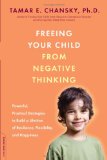Positive Strategies for Negative Thinkers
 Does your child have a tendency to look at life through somewhat darkened lenses? Today, Tracy offers a review of Freeing Your Child from Negative Thinking, a book for parents of kids who tend towards negative thinking. Read on for Tracy’s review, as well as to learn how to be one of two winners to receive a copy of this book!
Does your child have a tendency to look at life through somewhat darkened lenses? Today, Tracy offers a review of Freeing Your Child from Negative Thinking, a book for parents of kids who tend towards negative thinking. Read on for Tracy’s review, as well as to learn how to be one of two winners to receive a copy of this book!
“When I was offered the opportunity to review Tamar E. Chansky’s Freeing Your Child from Negative Thinking, I couldn’t pass it up. My oldest child definitely tends toward negative thinking, and this can have him – and sometimes the rest of us – feeling pretty down. I was out of ideas, and hoped that this book would inspire some new coping strategies.
My first reaction to this book, however, was one of increased worry. The book begins by describing why negative thinking is something to target in young children. But the reality is that while negative thinking is a risk factor for depression, it is only one of many. Once I remembered this fact, and reminded myself that my child has many more protective factors against depression, I read on to learn more. And I’m glad I kept reading because the message is inherently positive.
The most reassuring message from this book is that children who tend to think negatively don’t actually want to feel bad about things. It’s as if their default is set differently, and helping them work past that first stop is the key to freeing them. Chansky offers many tips, strategies, scripts, and activities for a variety of ages in an easy to understand format, even if they’re not always easy to implement. Personally, the most difficult part of working with my child is finding the right combination of talking, timing, and trying things out.
For example, at my son’s age (7), most emotions are felt rather intensely, and a negative one is no exception. It doesn’t work for our family to target the thinking in the moment; he often needs quite a bit of time to calm down to the point that any message will get through. Subsequently, one of my biggest growth experiences as a parent has been to learn that I don’t have to feel responsible for preventing him from viewing a situation negatively, but that I can be his best ally in working past that initial reaction. For the most part, this mindset is helping both of us, but it is hard work. It’s tiring, and it’s painful to see your child feel bad about things. I am happy to report, however, that by using some of the strategies in Freeing Your Child from Negative Thinking we are seeing a change and now have a common language to use that can help.
My only con about the book is the organization of the first few chapters. I wish that the book hadn’t been set up to initially make me more worried about an already stressful situation. While I know that childhood depression is on the rise, all the stats and figures freaked me out (and I’m a psychologist!). However, Chansky’s opening chapters certainly helped me identify the particular “negative style” my child has, and I think from there, the cognitive and emotional consequence of thinking negatively could help flesh out the picture for the average parent. Reading about how to identify if your child has depression could end the introduction section, because I do think it’s important information.
Overall, I think this book is a useful addition to a parenting library if you’ve got a child who has difficulty seeing past their difficulties. You just might be able to lighten their lenses from gray to rose-colored with a little bit of perseverance.”
THIS CONTEST IS NOW CLOSED
Congrats to winners Jennifer & Kim!
+ + + + +
Now, want to be 1 of 2 winners to receive a copy of Freeing Your Child from Negative Thinking*? Here’s how:
